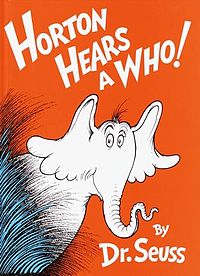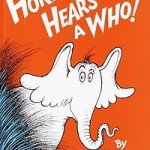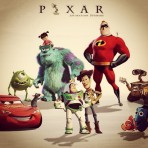Author: Dr. Seuss
Year Copyright: 1954
Copy: I stole the big orange hardcover copy from my almost three year old daughter.
 Gist: An elephant named Horton finds out that there’s a planet full of people living on a speck of dust. Horton can apparently talk to someone who lives on the speck and they find themselves having cute little conversations. Horton sometimes appears crazy since he’s talking to no one visible. Horton spends a lot of time trying to convince other people in the jungle that there really are people on his speck and that they are important and since they’re smaller they need to be protected. Horton says, “A person’s a person no matter how small.” Some characters call Horton crazy and try to stop him from giving so much attention to the speck and his imaginary friends.
Gist: An elephant named Horton finds out that there’s a planet full of people living on a speck of dust. Horton can apparently talk to someone who lives on the speck and they find themselves having cute little conversations. Horton sometimes appears crazy since he’s talking to no one visible. Horton spends a lot of time trying to convince other people in the jungle that there really are people on his speck and that they are important and since they’re smaller they need to be protected. Horton says, “A person’s a person no matter how small.” Some characters call Horton crazy and try to stop him from giving so much attention to the speck and his imaginary friends.
My Ideas: I’ve been wanting to write something about this story for quite some time now. I’ve had to sit through the movie a number of times as well as read the book to my daughter. While my daughter rocks in her little chair and chews on her apple strips I’m seeing a number of interesting metaphors present in this story of Horton hearing a who.
First off, it’s important to know that Dr. Seuss was originally a political cartoonist. So, it’s not hard to see that most of his stories, even though they’re for children, often have a parallel political connotation. I saw quite a few of these in this story.
Horton is a huge elephant and finds a whole planet of new creatures known as whos. This looks like Dr. Seuss is trying to parallel explorers or colonizers who come upon new lands of people possibly less developed. It’s kind of like a story about colonialism, but with a happy ending. In this story the colonizer protects and appreciates the value of the new civilization instead of raping it for its natural resources and leaving the country to political collapse. So just from the imagery of a huge elephant discovering a small speck the author makes an interesting comparison possibly drawing on the colonial narrative.
Then you have Horton trying to tell others that not only are there people on his speck, but that they matter. One of my professors from college made the point that it wasn’t that people like Hitler or Pol-Pot tried to make their enemies matter not at all, it was that they were able to make them matter very little. This idea has stuck with me for a long time and I’ve thought about it deeply. What I understood from this comment is that when a culture or group of people are seen as being worth very little it is much easier to justify their horrific treatment. They matter just enough to pay them attention, but not enough for fair or equal treatment. Horton is trying to make clear that his speck and all the people on it matter. “A person’s a person no matter how small.” I see this as being like the PhD student trying to defend his dying case study natives against impending development within their homeland jungle – trying to prove that they matter.
The interesting end to the story is that in order to save themselves from being totally destroyed by Horton’s jungle mates the people of the speck must make themselves audibly heard. They have to get the attention of the rest of the larger animals. How does this translate? Is ones identity only guaranteed by it’s recognition by others? Can I only be considered an American if someone else agrees with me? I don’t necessarily believe that’s what Dr. Seuss was hoping my three year old was going to glean from this book, but it’s an interesting thought nevertheless.
That completes some of the ideas I had about this book. It’s an interesting take on a kids book, but knowing Dr. Seuss was a political cartoonist and knowing a little bit of history helped me see a couple of interesting parallels. Or, am I looking too deep into a simple kids book? What other connections do you see?







Leave a reply